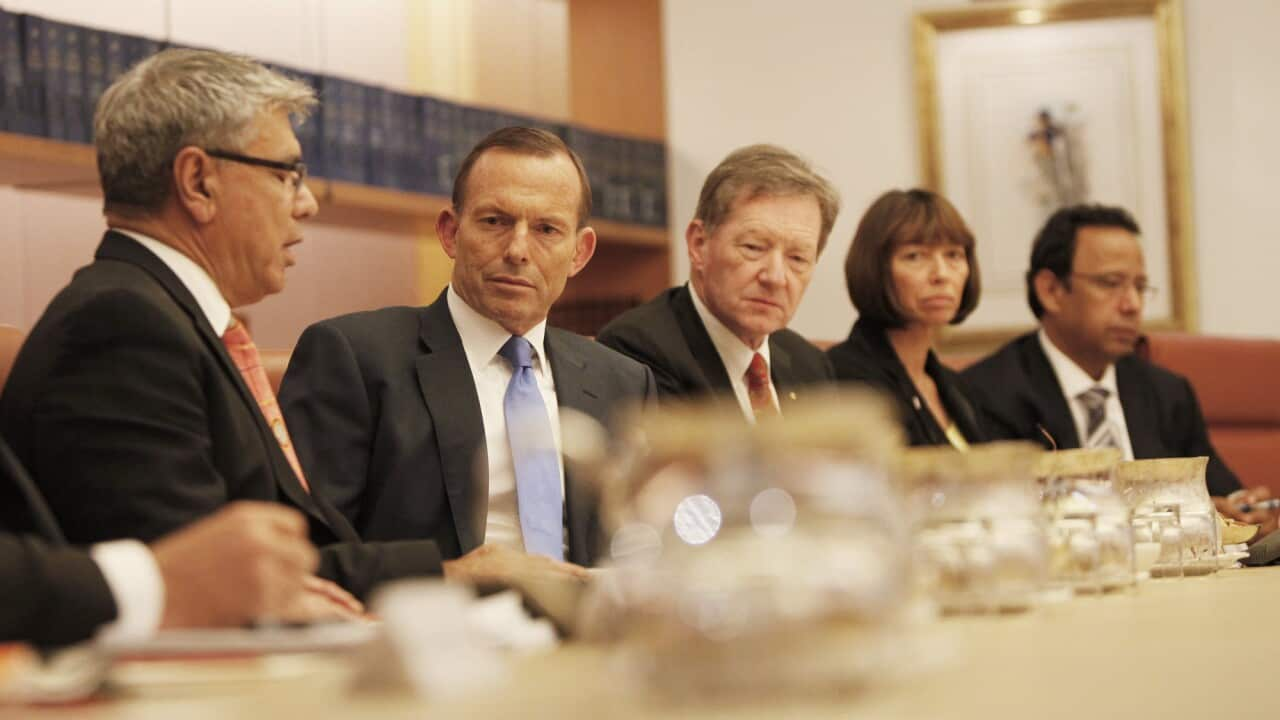The future is uncertain for the Indigenous Advisory Council, the 12-member group set up by former Prime Minister Tony Abbott, with no clear directive yet from the Turnbull government.
Prime Minister Malcolm Turnbull’s first ministry, revealed this week, saw no changes to Indigenous agenda of Tony Abbott.
Indigenous Affairs Minister Nigel Scullion kept his job, the portfolio remained in the Department of Prime Minister and Cabinet (PM&C), and Assistant Minister Alan Tudge (who was vital in Tony Abbott’s Indigenous policies) was neither promoted nor demoted.
"We're still alive," said Indigenous Advisory Council chairman Warren Mundine.
We're still having our meetings and going ahead with things...That will continue until such time as we get a phone call informing us of other directions
"We're still having our meetings and going ahead with things because it's a big agenda towards the October meeting about economic participation and employment. That will continue until such time as we get a phone call informing us of other directions."
Tony Abbott created the council in 2013 to provide advice on his Indigenous agenda.
"The council is not a representative body, and the 12 members provide a diversity of views and experience," it explains on its website.
"The council’s role is to advise government on practical changes which can be made to improve the lives of Indigenous people."
The council has been subject to constant criticism by First Nations people who feel it is being given preferential treatment and funding over the National Congress of Australia’s First Peoples, the democratically elected body to represent Aboriginal and Torres Strait Islander peoples.
It is intended that the council meet up to six times a year, in addition to chairman Warren Mundine participating in monthly meetings with PM&C.
Earlier this month, Mr Turnbull indicated his willingness to work with National Congress, but the future of the council is unclear.
Warren Mundine is keen to continue his work with a new boss.
Malcolm Turnbull is very much about the economy, about improving peoples’ socio-economic standing and so on. They’re the things we want to see in the Indigenous space
"Malcolm Turnbull is very much about the economy, about improving peoples’ socio-economic standing and so on. They’re the things we want to see in the Indigenous space," he said.
He has also paid tribute to former prime minister Tony Abbott.
"The foundations were laid in so many areas. People can argue about some of the directions and policies, but nothing could be better than the high-profile Indigenous affairs have enjoyed over the last few years; how it’s been front and centre of government thinking, and that needs to continue if we’re well and truly going to close the gap."
The council is due to meet next month.
Mr Mundine says one thing the council wants to continue is the focus on the Indigenous Procurement Policy.
"There's no doubt the Indigenous procurement policy will continue because that is going to be a major change. We're looking at, by 2020, the potential of $1.2 billion going into Aboriginal communities annually. That is going to make a massive difference to our communities."
Mr Turnbull is also expected to continue Mr Abbott’s push for Constitutional recognition of Indigenous people, and visit remote Indigenous communities.
"Politicians still need to have face-to-face meetings on the ground with Indigenous people on their own country," Mr Mundine said.
"Then they'll know exactly how people feel and hear the voices of community leaders, and also the living standards and opportunities in those communities.
"Without doing that, they won’t fully be able to understand Indigenous people."
Indigenous Advisory Council members
Warren Mundine (chairman)
Prof Ngiare Brown (Deputy Chair)
Richie Ah Mat
Daniel Tucker
Leah Armstrong
Josephine Cashman
Djambawa Marawili
Bruce Martin
David Peever
Andrew Penfold
Prof Peter Shergold.
Indigenous Procurement Policy
- A three-part policy applying to all non-corporate Commonwealth entities:
- A target number of contracts to be awarded to Indigenous businesses.
- A mandatory set-aside of contracts for Indigenous businesses.
- Mandatory minimum contractual requirements for Indigenous employment.

